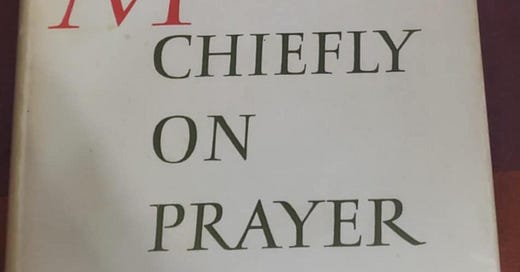14“For if you forgive others for their transgressions, your heavenly Father will also forgive you.
15“But if you do not forgive others, then your Father will not forgive your transgressions.
Matthew 6:14–15 (NASB95)
We open this chapter with something I’ve never experienced. Lewis claims to have suddenly forgiven someone they could not forgive, and it was like a light switch coming on for him. I’ve never had that happen. I was about to type that I didn’t have anyone I hadn’t been able to forgive until a name popped into my head, and I realized I do have a festering someone I still hold a grudge against. Now that the name is in my head, I’m stuck on retracting my opening sentences, but I cannot in intellectual honesty do that. It seems I have some work to do on the forgiveness front.
We have a word I haven’t read before next. Tautology. Here is the definition from dictionary.com.
Tautology
[ taw-tol-uh-jee ]
noun
plural tautologies.
Needless repetition of an idea, especially in words other than those of the immediate context, without imparting additional force or clearness, as in “widow woman.”
An instance of such repetition.
Logic.
A compound propositional form all of whose instances are true, as “A or not A.”
An instance of such a form, as “This candidate will win or will not win.”
The idea of us being forgiven for our sins when we forgive others is the tautology, the needless repetition of the idea, but only in Heaven. For us on Earth, it is neither needless nor repetitious. We need to hear and understand when we forgive others, we are forgiven ourselves. That new word is used in conjunction with Lewis bringing up the parable of the Unjust Judge, which I have below.
1Now He was telling them a parable to show that at all times they ought to pray and not to lose heart,
2saying, “In a certain city there was a judge who did not fear God and did not respect man.
3“There was a widow in that city, and she kept coming to him, saying, ‘Give me legal protection from my opponent.’
4“For a while he was unwilling; but afterward he said to himself, ‘Even though I do not fear God nor respect man,
5yet because this widow bothers me, I will give her legal protection, otherwise by continually coming she will wear me out.’ ”
6And the Lord said, “Hear what the unrighteous judge said;
7now, will not God bring about justice for His elect who cry to Him day and night, and will He delay long over them?
8“I tell you that He will bring about justice for them quickly. However, when the Son of Man comes, will He find faith on the earth?”
Luke 18:1–8 (NASB95)
That one is in conjunction with, and leading into the topic for this chapter, praying for and forgiving the dead. Is there any point? Lewis contends there is, but I don’t think I’ve ever considered it before now. I will confess of late, especially with my uncle dying, that the concept that those I know and love will pass on is hitting home. Oh, I have two very good friends whose parents both are gone now. I went to the funerals for both of the one, but the other I did not as it just happened so quickly. Both my parents are still here so that reality hasn’t struck close to home yet, but the idea has certainly taken root.
What about praying for the dead?
In the very next paragraph Lewis sums up what is going through my head as I’ve been writing this. After death, the judgment has occurred. Those who have passed on are either sheep or goats, in Heaven or Hell. I’m not sure my prayers can amend or do anything about either position.
Keep reading with a 7-day free trial
Subscribe to Small Group Bible Study Material - The Cavalier's Pen to keep reading this post and get 7 days of free access to the full post archives.




